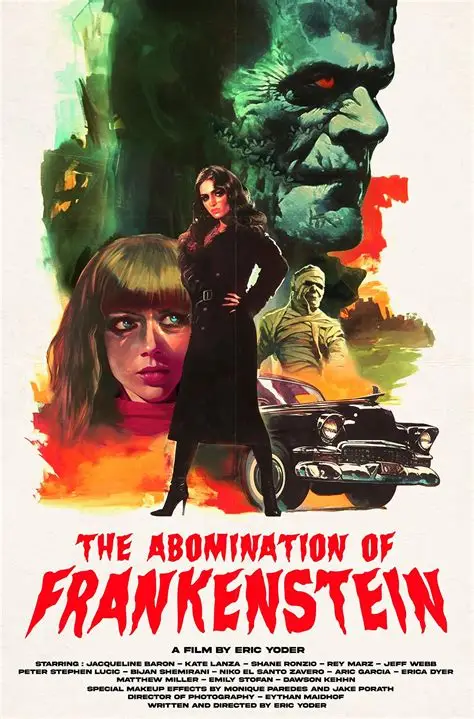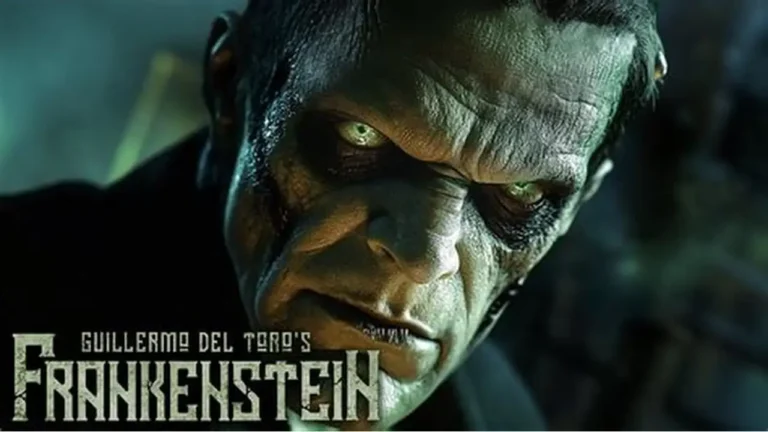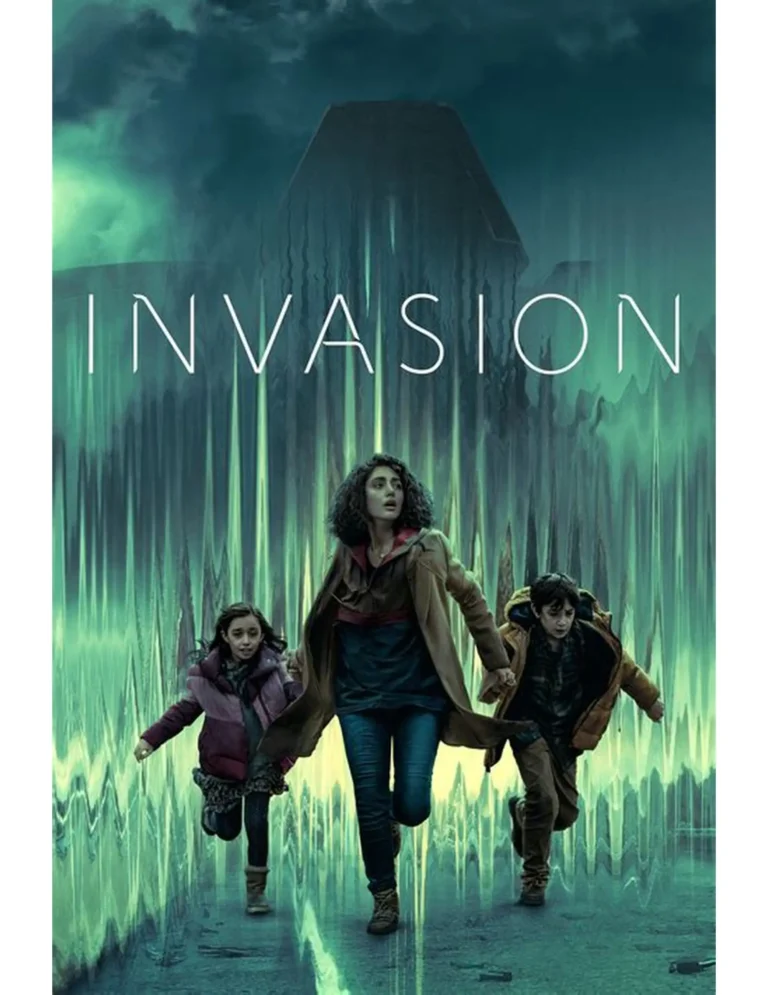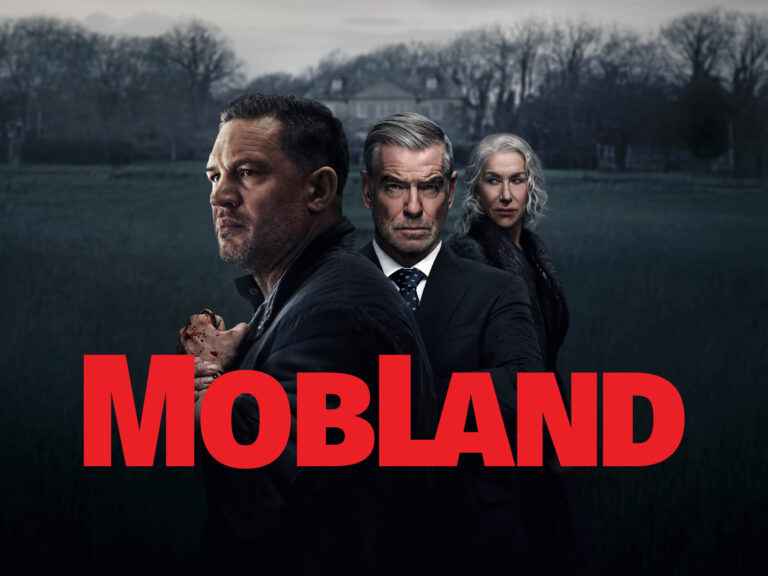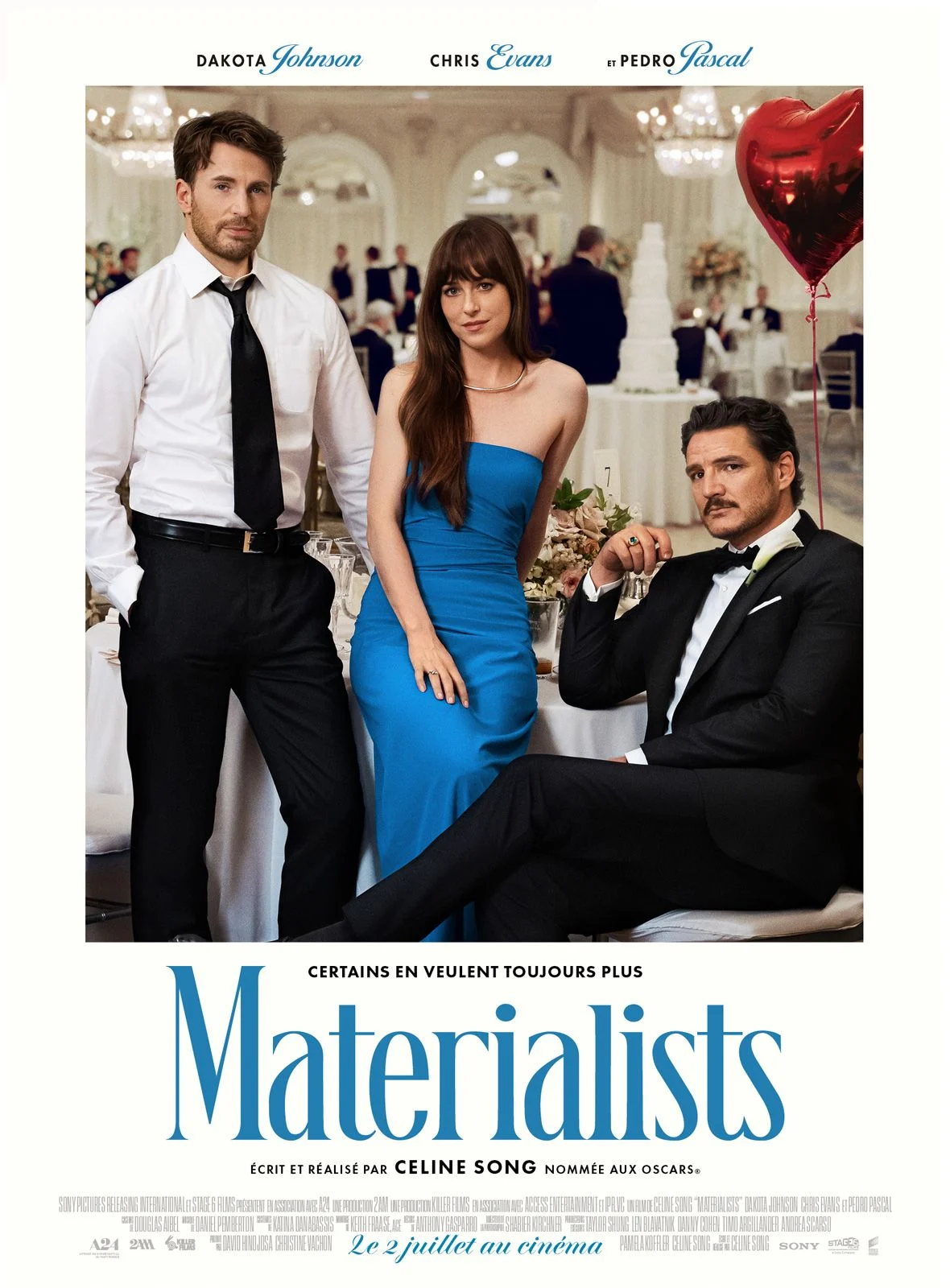
Materialists
Materialists (2025) is one of the most anticipated romantic comedies of the year, blending sharp social satire with heartfelt romance. Directed by Celine Song, and starring Dakota Johnson, Chris Evans, and Pedro Pascal, this English-language film is scheduled for release on June 13, 2025.
Movie Overview
Materialists is a romantic comedy-drama that delves into the complexities of modern relationships, set against the backdrop of New York City’s luxury-driven dating culture. The film follows Lucy Mason (Dakota Johnson), a successful matchmaker at Adore, who finds herself torn between her charming millionaire client Harry Castillo (Pedro Pascal) and her aspiring actor ex-boyfriend John Pitts (Chris Evans). As Lucy navigates the challenges of her professional and personal life, the story explores themes of love, identity, and the impact of wealth on relationships.
Attribute Details
- Title: Materialists
- Genre: Romantic Comedy, Drama
- Language: English
- Release Date: June 13, 2025 (USA), August 16, 2025 (International)
- Director: Celine Song
- Writer: Celine Song
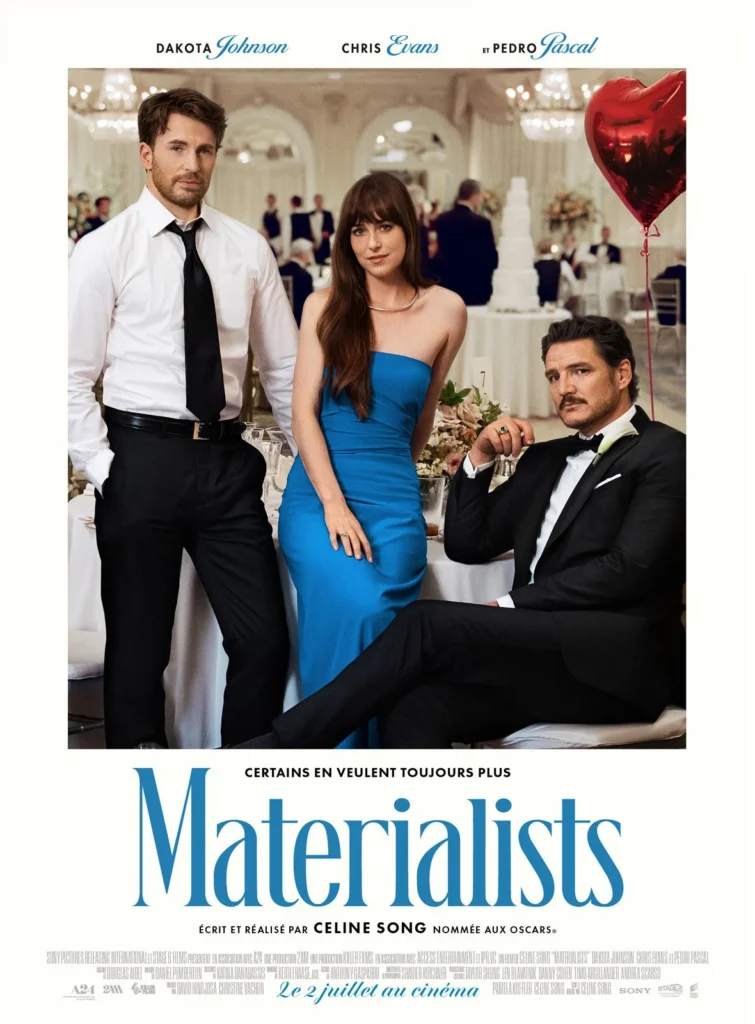
Cast and Characters
The film features a talented ensemble cast:
- Dakota Johnson as Lucy Mason, a matchmaker caught in a love triangle.
- Chris Evans as John Pitts, Lucy’s ex-boyfriend and a struggling actor.
- Pedro Pascal as Harry Castillo, a wealthy client who becomes romantically interested in Lucy.
- Zoë Winters as Sophie, a 39-year-old client of Lucy.
- Marin Ireland as Violet, Lucy’s superior at Adore.
- Louisa Jacobson as Charlotte, another of Lucy’s clients.
- Dasha Nekrasova as Daisy, a co-worker at Adore.
- Eddie Cahill, Sawyer Spielberg, and Joseph Lee in supporting roles as Lucy’s clients.
Production and Filming
Materialists is written and directed by Celine Song, known for her acclaimed debut film Past Lives. The film is produced by David Hinojosa, Christine Vachon, Pamela Koffler, and Celine Song. Cinematography is handled by Shabier Kirchner, with editing by Keith Fraase. The musical score is composed by Daniel Pemberton, and the soundtrack includes original songs by Japanese Breakfast and Baby Rose.
Distribution and Release
The film was released in the United States by A24 on June 13, 2025. International distribution is managed by Sony Pictures Releasing International, with the film opening in select markets on August 16, 2025. Materialists is available for streaming on Prime Video and has been released on 4K UHD, Blu-ray, and DVD formats. In India, the film is available for streaming through a regular subscription at no extra cost on select OTT platforms.
Critical Reception
Materialists has received generally positive reviews from critics. According to Rotten Tomatoes, the film has garnered a favorable rating, with critics praising its wit and sharpness in capturing the tensions of love in the age of digital dating. However, some reviews note that while the film may not delve as deeply into emotion as its predecessor, Past Lives, it still manages to engage audiences with its charming performances and insightful commentary on modern relationships.
Box Office Performance
Materialists has been a commercial success, grossing $103.5 million worldwide. It became A24’s third-highest-grossing film and the highest-grossing independent film of the year. The film’s success is attributed to its appealing cast, engaging storyline, and timely exploration of themes relevant to contemporary audiences.
Soundtrack Highlights
The film’s soundtrack features original compositions by Daniel Pemberton, with contributions from Japanese Breakfast and Baby Rose. The song “My Baby (Got Nothing At All)” by Japanese Breakfast was released as a single on June 9, 2025, and has been praised for its dreamy and emotive quality. Baby Rose’s tracks “I’ll Be Your Mirror” and “That’s All” were also featured in the film and released as singles on June 13, 2025.
Themes and Analysis
Materialists explores themes of love, identity, and the commodification of relationships in a consumer-driven society. The film examines how wealth and status influence romantic choices and the challenges of maintaining genuine connections in a world dominated by superficial values. Through its characters and narrative, the film prompts audiences to reflect on the complexities of modern love and the impact of materialism on personal relationships.
Lucy Mason’s Character Arc
Lucy Mason, portrayed by Dakota Johnson, experiences significant personal and professional growth throughout the film. Initially focused on matching wealthy clients with ideal partners, she gradually confronts her own desires and values, realizing that love cannot be measured by status or material wealth. Her journey from a confident matchmaker to a self-aware individual provides emotional depth to the narrative.
Exploring the Love Triangle
The love triangle between Lucy, John Pitts, and Harry Castillo serves as the central dramatic tension. Each character represents a different path in Lucy’s life: passion, stability, and ambition. The interplay of these dynamics examines choices, compromise, and the complexity of modern relationships.
Chris Evans’ Portrayal of John Pitts
Chris Evans delivers a nuanced performance as John Pitts, the struggling actor and Lucy’s ex-boyfriend. His vulnerability, humor, and persistence make John relatable, highlighting the challenges of balancing personal ambition with romantic relationships in a materialistic world.
Pedro Pascal as Harry Castillo
Pedro Pascal’s portrayal of Harry Castillo emphasizes charm, confidence, and wealth-driven allure. His character embodies the materialistic pressures present in contemporary dating culture, offering a foil to John’s more grounded persona and creating tension within the love triangle.
Adore: A Satirical Look at Matchmaking
The fictional matchmaking company Adore satirizes the luxury-driven dating industry. Through exaggerated client demands, strict professional protocols, and high-stakes matchmaking challenges, the film critiques the commercialization of love and the absurdity of materialism in modern romance.
Humor and Social Commentary
Materialists balances romantic tension with sharp humor. The witty dialogue and situational comedy provide levity while simultaneously critiquing societal obsessions with wealth, status, and appearances. Humor is used strategically to make social commentary both engaging and accessible.
New York City as a Character
The film’s setting in New York City is more than a backdrop; it reflects the high-pressure, fast-paced environment of luxury dating and social status. Cinematography captures iconic locations, upscale neighborhoods, and contrasting environments to emphasize the disparity between characters’ public personas and private struggles.
Cinematography and Visual Storytelling
Shabier Kirchner’s cinematography uses color, lighting, and framing to reinforce themes. Warm tones accompany intimate, heartfelt scenes, while cooler, high-contrast lighting highlights tension and materialistic excess. Visual storytelling complements character development and narrative pacing.
Music as Emotional Amplifier
The film’s soundtrack, composed by Daniel Pemberton, enhances emotional resonance and narrative pacing. Original songs by Japanese Breakfast and Baby Rose provide modern, melodic interludes that reflect character moods, reinforcing both romantic and dramatic beats throughout the film.
Editing and Narrative Flow
Keith Fraase’s editing ensures a seamless narrative flow, balancing comedic moments with heartfelt drama. Well-timed cuts maintain rhythm during fast-paced matchmaking sequences and allow audiences to absorb emotional beats in character-driven scenes.
Fashion and Costume Design
Costume design reflects character personalities and societal roles. Lucy’s professional attire emphasizes sophistication and control, while John’s casual, understated wardrobe contrasts his humble, grounded approach. Harry’s luxury-inspired outfits highlight the opulence and expectations of materialistic culture.
The Role of Supporting Characters
Supporting characters like Violet, Sophie, and Charlotte add depth to the social environment of the film. Their varied backgrounds and personal desires reflect broader societal attitudes toward love, money, and ambition, enriching the narrative and creating diverse perspectives on relationships.
Modern Romance and Materialism
Materialists explores the intersection of modern romance and materialism, questioning whether genuine love can exist in a society obsessed with wealth and appearances. The film encourages viewers to examine their own priorities and perceptions of value in relationships.
Character Chemistry and Interactions
The chemistry between the lead actors drives much of the film’s emotional impact. The interactions between Lucy and her two love interests are layered with tension, humor, and subtle emotional cues, making relationships believable and engaging.
Satirical Depiction of Dating Culture
The film offers a humorous critique of dating apps, matchmaking services, and the pursuit of idealized partners. By exaggerating client demands and social expectations, Materialists exposes the absurdity and pressure inherent in modern dating culture.
Exploring Identity and Self-Discovery
Lucy’s journey is as much about self-discovery as romance. Through interactions with clients and love interests, she confronts her values, desires, and personal boundaries, ultimately embracing authenticity over societal expectations.
Ethical Dilemmas in Matchmaking
The film examines ethical challenges in the matchmaking industry, such as manipulating client preferences, prioritizing profit over genuine connection, and balancing personal morals with professional obligations. These dilemmas add depth and realism to the story.
Representation of Women in Leadership
Through characters like Lucy and Violet, Materialists highlights female leadership in professional environments. Their authority, decision-making, and career challenges reflect contemporary issues faced by women in corporate and entrepreneurial spaces.
Romantic Comedy with Dramatic Depth
Unlike traditional rom-coms, Materialists combines humor with meaningful character exploration. Moments of tension, heartbreak, and self-reflection ensure that the story resonates emotionally while maintaining light-hearted, entertaining elements.
Impact of Wealth on Relationships
The film critiques how wealth and status influence romantic decisions. Characters navigate power dynamics, social expectations, and personal insecurities, illustrating the complexities of balancing love with material aspirations in modern society.
Dialogue and Screenplay Quality
Celine Song’s screenplay blends witty, realistic dialogue with insightful observations about contemporary romance. Conversations between characters reveal personal motivations, societal pressures, and emotional growth, enriching both character and plot development.
Audience Reception and Cultural Relevance
Materialists resonates with audiences due to its relatable themes of love, ambition, and self-identity. Its commentary on materialism in relationships encourages reflection, while humor and romance make it widely appealing across demographics.
Streaming Accessibility
The film’s availability on Prime Video ensures global reach, allowing audiences worldwide to experience its narrative. Subtitles and dubbed versions in multiple languages increase accessibility, expanding cultural impact and fostering discussion on social media platforms.
Box Office and Commercial Success
Materialists has achieved impressive box office results, reflecting both critical acclaim and audience interest. Its commercial performance demonstrates the continued appetite for romantic comedies with modern social commentary and star power.
Legacy and Influence
Materialists sets a precedent for contemporary romantic comedies that combine humor, romance, and social critique. Its success may inspire filmmakers to explore modern dating, materialism, and self-discovery in innovative ways within the genre.
Final Reflection
Ultimately, Materialists (2025) balances humor, romance, and social commentary to provide an engaging, thought-provoking cinematic experience. With strong performances, relatable characters, and insightful exploration of modern love, the film stands out as a defining romantic comedy of the year.
Lucy’s Professional Challenges
Lucy Mason faces significant professional obstacles as a matchmaker at Adore. Balancing client expectations, navigating office politics, and managing her own moral compass creates tension and drama. These challenges humanize her character and highlight the pressures of working in a luxury-focused industry.
Exploring the Wealth Gap in Relationships
The film critiques the influence of wealth on romantic relationships. By juxtaposing John’s modest lifestyle with Harry’s opulence, Materialists illustrates how socioeconomic status shapes dating expectations and power dynamics, prompting audiences to reflect on their own biases.
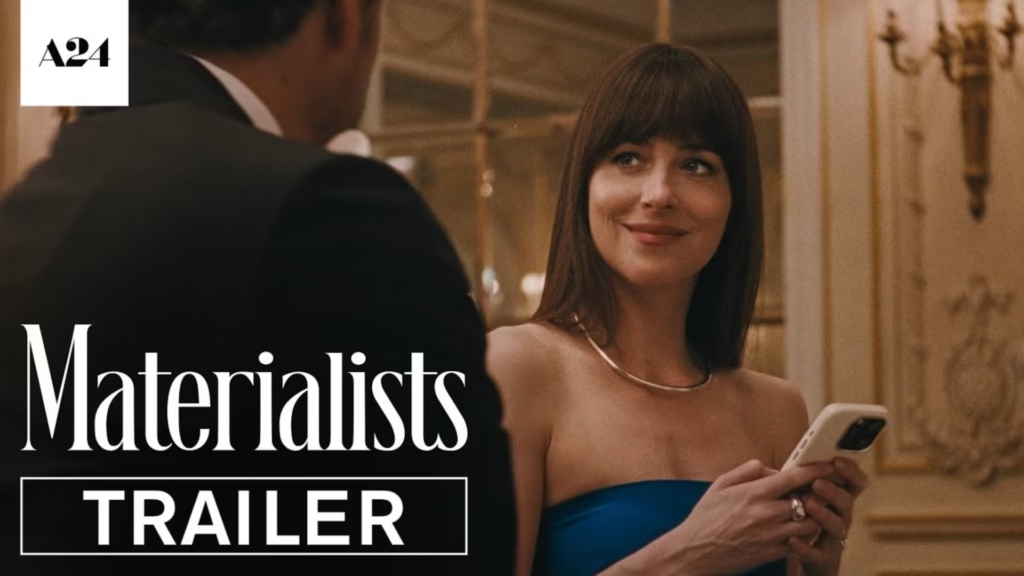
Humor as a Narrative Tool
Materialists uses humor not only for entertainment but as a tool to critique societal norms. Witty dialogue, situational irony, and comedic timing highlight absurdities in the dating world, enhancing audience engagement while delivering subtle social commentary.
Romantic Tension and Chemistry
The chemistry between Dakota Johnson, Chris Evans, and Pedro Pascal drives much of the film’s emotional weight. Subtle glances, witty banter, and contrasting personalities create believable romantic tension that keeps viewers invested in character outcomes.
Supporting Characters as Mirrors
Secondary characters such as Sophie, Violet, and Daisy serve as mirrors to Lucy’s journey. Their experiences, choices, and dilemmas reflect different aspects of love, ambition, and materialism, providing depth and context to the protagonist’s decisions.
The Role of Technology in Modern Dating
The film incorporates modern dating tools such as apps, social media, and curated profiles. These elements highlight the challenges of authenticity, the pressure of appearances, and the superficial nature of digital matchmaking, offering a critique of contemporary romantic culture.
Visual Symbolism and Set Design
Materialists employs symbolic set design to reinforce themes. Lavish apartments, sleek office spaces, and bustling urban streets reflect materialism and societal expectations. Contrasting intimate spaces highlight vulnerability and emotional honesty in character interactions.
Soundtrack as a Storytelling Element
Daniel Pemberton’s score underscores narrative arcs, using music to evoke emotion and enhance storytelling. Songs by Japanese Breakfast and Baby Rose provide lyrical depth, reflecting Lucy’s internal struggles and the tension of romantic entanglements.
Costume Design and Character Identity
Costumes in Materialists are carefully chosen to reflect personality, status, and character evolution. Lucy’s stylish wardrobe evolves as she grows emotionally, John’s casual outfits highlight relatability, and Harry’s luxurious attire emphasizes wealth and power dynamics.
Editing Techniques for Romantic Comedy
Keith Fraase’s editing balances pacing between comedic beats and dramatic moments. Quick cuts enhance humor and timing, while longer takes emphasize emotional tension, ensuring audiences are both entertained and invested in the narrative.
Exploring Self-Discovery Through Romance
Materialists portrays romance as a catalyst for self-discovery. Lucy’s journey illustrates how personal growth often occurs through navigating complex relationships, making choices, and confronting societal expectations, providing a relatable theme for modern audiences.
Thematic Depth of Materialism
The film critiques the obsession with wealth and status in romantic contexts. By exploring how materialism influences attraction, decision-making, and personal fulfillment, Materialists encourages viewers to consider what truly matters in love and life.
Social Commentary on Modern Society
Beyond romance, Materialists offers social commentary on contemporary life, including career pressures, gender expectations, and the commodification of relationships. These elements make the film more than a light-hearted comedy, giving it cultural relevance.
Lucy and John’s Emotional Vulnerability
The interactions between Lucy and John reveal emotional vulnerability and past regrets. These moments of honesty deepen audience connection, highlighting themes of forgiveness, self-awareness, and the complexity of human emotion in romantic relationships.
Harry Castillo as a Symbol
Harry represents the allure and pitfalls of materialism. His wealth and charm create a compelling alternative to John’s modest lifestyle, forcing Lucy to confront societal pressures, personal desires, and the distinction between superficial attraction and genuine connection.
Interpersonal Dynamics at Adore
The workplace environment at Adore is a microcosm of societal hierarchies and pressures. Interactions among colleagues, superiors, and clients reveal power struggles, ambition, and ethical conflicts, adding layers to the narrative beyond the central romance.
Use of Metaphor and Symbolism
Materialists employs metaphorical elements to deepen thematic resonance. Objects like luxury gifts, digital profiles, and curated settings symbolize societal obsession with image, status, and validation, reinforcing the film’s critique of modern materialism.
Exploring Authenticity in Relationships
The film examines the tension between authenticity and societal expectations. Characters grapple with presenting their true selves versus conforming to perceived ideals, highlighting challenges that resonate with contemporary audiences navigating dating and social media pressures.
Comedy as Emotional Relief
Humorous sequences provide emotional relief amidst dramatic tension. Situational comedy, awkward encounters, and witty dialogue create a balance, ensuring that the film maintains a light-hearted tone while exploring serious themes.
Audience Engagement and Relatability
Materialists engages audiences by portraying relatable scenarios, such as dating challenges, career ambitions, and societal pressures. Its blend of humor, romance, and social critique allows viewers to see reflections of their own experiences, enhancing emotional investment.
Global Accessibility Through Streaming
The film’s distribution on Prime Video ensures international accessibility. Subtitles and dubbed versions in multiple languages broaden its reach, allowing viewers worldwide to connect with the story, characters, and themes, increasing cultural impact.
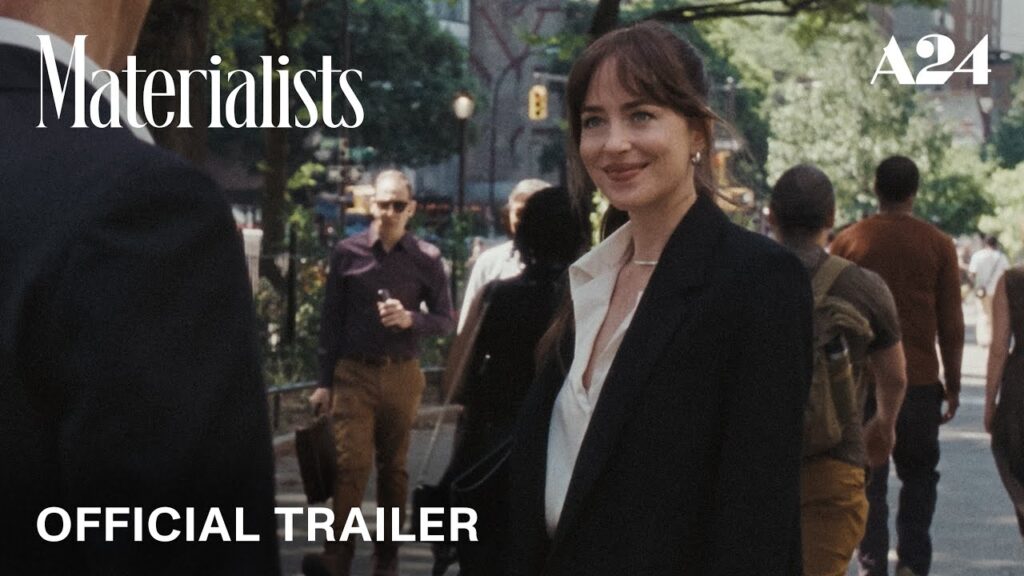
Impact of Critical Acclaim
Positive critical reception has amplified interest in Materialists. Reviews praising its writing, performances, and social commentary reinforce its reputation, contributing to box office success and sustained audience engagement.
Visual and Cinematic Style
The film’s visual style, including lighting, framing, and color palettes, enhances storytelling. Warm tones for intimate scenes and cool tones for professional or materialistic environments visually reinforce thematic contrasts, emphasizing character emotions and societal commentary.
Influence on Romantic Comedy Genre
Materialists demonstrates a modern evolution of romantic comedy by blending humor with social critique. Its success may inspire other filmmakers to explore similar themes, merging romance with cultural commentary and character-driven storytelling.
Legacy and Cultural Relevance
Materialists contributes to the ongoing discourse on love, materialism, and personal identity. Its combination of entertainment and insight ensures lasting relevance, appealing to audiences who value both humor and meaningful social observation.
Final Reflection
Ultimately, Materialists (2025) offers a compelling mix of romance, comedy, and cultural critique. With strong performances, layered characters, and thoughtful exploration of modern relationships, the film stands out as a defining work in contemporary romantic comedy cinema.
